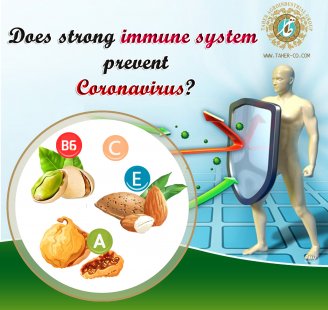
Since the coronavirus spread throughout 32 countries and areas, they become a continuous threat to human health. Standard recommendations to prevent infection spread include regular hand washing, covering mouth and nose when coughing and sneezing, thoroughly cooking meat and egg [1]. In addition, there are other ways to prevent it.
Immune system vs. corona
Since the coronavirus spread throughout 32 countries and areas, they become a continuous threat to human health. Standard recommendations to prevent infection spread include regular hand washing, covering mouth and nose when coughing and sneezing, thoroughly cooking meat and egg [1]. In addition, there are other ways to prevent it.
The key to good health is a strong immune system. The immune system is the body’s natural defense system. If we have a weakened immune system we are more susceptible to colds, flu, and other problems (such as Coronavirus). The powerful coordination of the immune system is such that it can be strengthened. Building a strong immune system is your best defense against infectious illness and disease.
Are you ready for a Stronger Immune System?
A healthy, balanced diet plays a vital role in staying well.
It is essential to give your body excellent daily nutrition to keep your immune system healthy and strong. Your immune health depends on the lifestyle you choose every day. Many foods may help to boost the immune system but try to choose the best.
Four Vitamins that are best for boosting your immunity are:
Vitamin C
Vitamin C is essential and most effective nutrients for good health because your body doesn’t produce or store it. High amounts of vitamin C are found in most fruits and vegetables, mixed nuts.
Vitamin A
Vitamin A has a critical role in enhancing immune function. Vitamin A is involved in the development of the immune system and plays regulatory roles in cellular immune responses and humoral immune processes [2]. Figs are one of the richest plant sources of Vitamin A.
Vitamin B6
Nutrient deficiencies, including B6, can disrupt the immune system. A deficiency in B6 can result in the decreased production of antibodies needed to fight infections [3]. B6 helps your body make a protein called interleukin-2, which helps direct the actions of white blood cells [4].
One ounce (28.4 g) serving of pistachios contains 0.4 mg of vitamin B6, helping you reach your daily recommended intake of this beneficial vitamin.
Vitamin E
Vitamin E is an antioxidant. It may help protect your cells from damage.
Almonds contain relatively high levels of vitamin E. One ounce (28.4 g) of plain almonds provides 7.27 milligrams (mg) of vitamin E, which is around half a person’s daily requirement.
References:
[1]. World Health Organization.
[2]. Zhiyi Huang, et al., “Role of Vitamin A in the Immune System”, Journal of Clinical Medicine, 2018.
[3]. Qian B. et al., “Effects of Vitamin B6 Deficiency on the Composition and Functional Potential of T Cell Populations”, Journal of Immunology Research, 2017.
[4]. S. N. Meydani, et al., “Vitamin B-6 deficiency impairs interleukin 2 production and lymphocyte proliferation in elderly adults”, The American Journal of Clinical Nutrition, 1991.






User comments